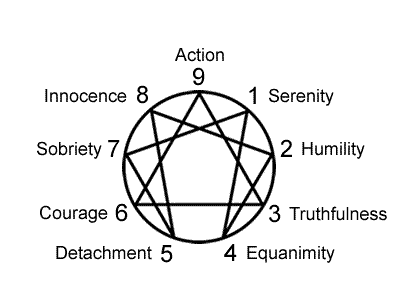Enneagram Virtues: Letting go of the ego passion

The Enneagram virtues stand in contrast to the Enneagram passions and were originally a part of Oscar Ichazo's ego-types. The passion is the emotional energy supporting our ego fixation. Developing the corresponding virtue helps us find freedom from the passion and thus ego fixation.
A similar concept can be found in Christianity with the vices and virtues (seven deadly or capital sins) where vice or sin is corrected by the virtue.
Ichazo's original virtues
Taken from the book Transpersonal Psychologies edited by Charles T. Tart, the descriptions of the virtues below come from John C. Lilly and Joseph E. Hart who attended the 1970 Arica retreat with Oscar Ichazo.
- Serenity - Serenity overcomes anger when one knows that his essence is perfect, as are the essences of all others.
- Humility - Humility is the obvious means of overcoming pride. Basically, one can realize that he bears the same perfect essence as others; he is not unique.
- Truthfulness - Truthfulness will help him to realize that he is what he is. He does not have to use deceit to maintain an outward image of importance.
- Equanimity - Happiness in the present moment or equanimity will help overcome the envy of the happiness of others.
- Detachment - Detachment from his secure hiding place and from the need to know everything will relieve him of his avarice, the struggle to protect his anonymity.
- Courage - Courage can replace fear. No one or no thing can harm his essence; only he has the choice of strengthening his ego or experiencing his essence.
- Sobriety - Sobriety will soon teach him that happiness is reached step by step and cannot be achieved once and for all by extreme measures and gluttony.
- Innocence - The excess of revenge on others and on himself can give way to a childlike innocence. "Why shouid I want to hurt anyone and why should anyone want to hurt me?”
- Action - The virtue is action directed toward experiencing one’s essence, overcoming laziness.
The virtues and the personality types
Understanding the virtues can help an individual work toward finding some freedom from the habits of personality type. It's easiest to understand each virtue by looking at it in contrast to the corresponding passion.
Type 1: Serenity appears when you become more accepting of things as they are instead of demanding that they meet your standards for how things should be.
Type 2: Humility appears when instead of seeking favored treatment and regard you accept that you are no more or less important than anyone else.
Type 3: Truthfulness appears when you find a sense of self that is true to who you are instead of playing to the expectations of an intended audience.
Type 4: Equanimity appears when you also see the positives you have to offer instead of just the negatives when comparing yourself to others.
Type 5: Detachment (Non-Attachment) appears when you allow yourself to more freely participate in the world instead of observing it from the sidelines.
Type 6: Courage appears when you step into action as circumstances dictate in spite of any lingering doubts or fears that you may have about doing so.
Type 7: Sobriety appears when you see endeavors through to the end instead of moving on to something easier and more interesting than what's at hand.
Type 8: Innocence appears when you allow yourself to experience tenderness and vulnerability instead of habitually pushing out against the world.
Type 9: Action appears when you pursue what's meaningful to you instead of simply going along to get along or falling into habitual routines and comfort.
Click here for the Complete Guide to the Enneagram.
This free guide explains- the nine Enneagram personality types
- the many type variations within type
- where the types came from (origins and history)
- how the types use the Enneagram symbol
Click here for Enneagram tests.
These free tests help you find your- primary type
- candidate types
- preferred wing
- intinctual subtype
- instinctual variant stacking
- center types (gut, heart, and head)
- tri-center with wings